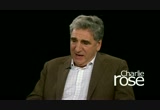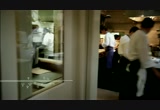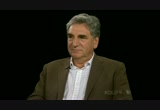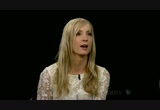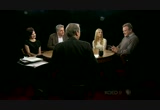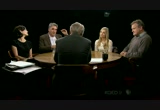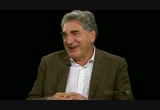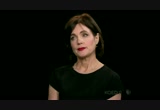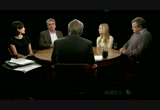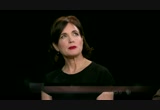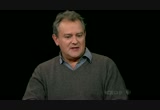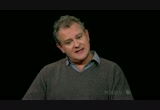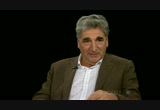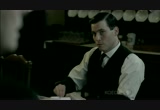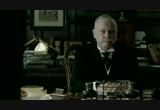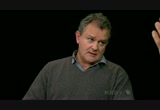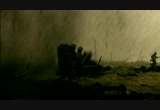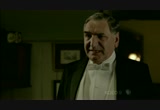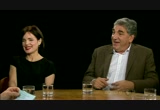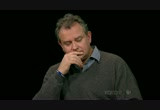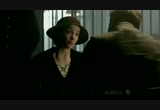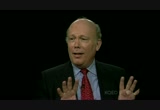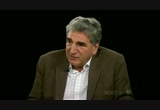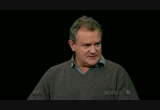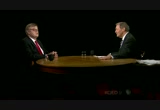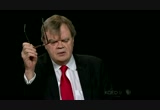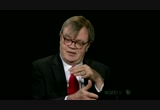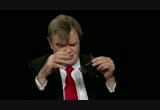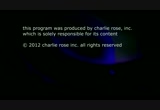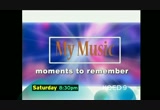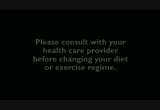tv Charlie Rose PBS December 12, 2012 12:00pm-1:00pm PST
12:00 pm
with the people upstairs, and you need that contrast, i think. >> yes, my lady. >> >> it is like you are walking on stilts. >> when does grandma arrive. >> i am so looking forward to seeing your mother. >> i am reminded of the virtues of the english. >> but isn't she american? >> exactly. >> and also from the world of public television, and public radio, garrison keillor. >> i worked for myself, which is a good idea, and i worked with these wonderful people, and industry all of these listeners, i don't know exactly how many, but when i walked down the street and people look at me and recognize me, they smile. and that is all -- that is really all you need in the world. >> rose: downtown abbey and
12:01 pm
12:02 pm
and by bloomberg, a provider of multimedia services worldwide. >> from our captioning sponsored by rose communications from our studios in new york city, this is charlie rose. >> rose: british period dramas have long held a special fascination for american television audiences, upstairs, downstairs, pride and prejudice have been released to widespread attention and praise, downton abbey anybody the most successful and the latest, oscar-winning prize winner julian fellows already won six emmys and legions on fans on both sides of the pond. it is back on pbs in january and here is a teaser for the third season. >> from war and peace downton abbey still stands.
12:03 pm
>> no one must know. >> i am warning you. >> rose: joining me now, four of the stars, hugh bonneville, plays lord granderson familiar. >> elizabeth mcgovern. >> lady grantham. >> jim carter plays the butler and joanne greg plays anna, the head house made, i am proud to have all of you here. >> let me start and go around and tell me where you left your character and what to expect this year. >> the end of season 2. >> robert was relieved that the war and the spanish flu had deserted at long last and maybe he would get his home back in the way he wanted. we open season three having discovering robert has made a
12:04 pm
catastrophic financial investment and so down o downton peril. >> rose: it is about 19th 20. >> 1920. >> yes. >> the whole of season three takes around 18 months. >> rose: okay. >> and at the end, of season 2, anna has just had her life almost in complete tatters as he is sentenced to the death sentence and gets a reprieve at the end of season 2 so anna starts season three much more positive because at least she has a goal now, she has something to work toward, she is trying to find evidence and try to clear mr. bates name and free herman. so yes, it is a more positive start for anna in season three. >> yes. and for carson, is stuffy old traditionalist he s all he wants to do is get two footmen in attendance at the dining table, he wants to get the staff levels back up to normal and have things go back to the way they were. >> rose: yes. >> grantham.
12:05 pm
>> rolls with the pumps and tried tries to make contain her even keel despite all of the crap her english family dump upon her. (laughter.) >> she does represent a certain class of american women at that time, who moved to english. >> are you surprised at the success of this? when you first read, did you think, oh, man i have to get in here because this is going to be great. >> i certainly felt, man who knows whether any project is going to -- >> it was a proper page turner by the end of the first episode, one that had been introduced to whatever it is 18 characters, very vividly and i think that fascination that i had upon reading it got translated on the screen and they want to know what happens next to those characters. >> rose: laid against the canvas of society. >> absolutely, well. >> and what is going on in the world. >> well, that's right.
12:06 pm
you don't feel it quite so much in the first season the outside world but that really invades in the second season, with the war years, and the effect of the spanish flu, and this third season we are about to show here in the u.s. is much more about the family and the house again, the world of downton abbey we have grown to love to see, the machinations and how all of that plays out. it wouldn't be enough just to have the lady, you need the upstairs and downstairs. >> you need the yin and the yang. >> they mirror each other and affect each other, the lives of the downstairs people intertwined with the people upstairs. and you needed that contrast, i think. >> somebody has to polish the silver. >> absolutely. >> that is very effective. he think also the success is the beginning of recognizable history, i mean my mother was born in 1919, my dad was born in
12:07 pm
1908. >> rose: mine too about then. >> so we see telephones and see the things we take for granted now, the telephones, cars, electricity creeping into society so it is not removed this the way the jane austen historical dramas are which are bustles and bonnets. >> this is the beginning of our recognized history now and i think that adds to the immediacy of the way. >> rose: were you born with that voice or acquire it? >> it was misspent youth. >> it just happened. >> rose: because i want to go auto tune that. is it as some say just ve good, well acted soap? >> yes. >> you say that as if that is a negative. >> no, no. >> i would say, yes. >> by definition, soap operas is episodic television involving characters. >> in that respect it is, yes, whereas a drama is often a single strand story. >> rose: but it is much more
12:08 pm
heavily produced and has a whole range of characters. >> i think if you lay too much burden on the show to be historically anything, relevant or completely 100 percent accurate, although every effort is made to be as accurate as possible, it doesn't withstand that, because it is meant to be an entertaining drama first and foremost, we want people to enjoy it, so i think we all hold up our heads with pride, you know, at that. >> look at all of the awards you clearly should. >> rose: anything about this that would make you want to live in that period? >> not as a house maid. >> rose: that's why i -- >> and -- >> not really. i mean, i think it is a lovely world to visit from our luxurious position, 21st century but not a world i embrace and a social structure i recognize but i think as a glimpse of a history, all beat it in our terms a fictional history it is a lovely place to visit but a
12:09 pm
lot easier for those upstairs than down. >> rose: i tell me about the mechanics, you say 11 hours of television and shot since months to create 11 hours of television. >> that's right. >> rose: you began on january 6th with two hours. >> well, yes. it takes all of that time to actually put the pieces together but once it is edited and so on -- >> rose: two and a half hours. >> but six months to shoot it. >> historical dramas, you have horses and characters and wigs and complicated cross stiewments, julian fellows writes big dinner party seasons with ten speaking characters. >> rose: right. >> the food has to be replaced between each take and the candles have to be moved so they are not this the shot, it is a juggernaut of an affair to manipulate, so it is, you know, we work 11 days out of 14, and from 8:00 o'clock to the morning to 7:00 o'clock at night for six months and the crew every minute
12:10 pm
of that, we get time off. >> yes, it is hard work but plate and with all of the upstairs, sort of the high clear castle which is an hour and 20 minutes outside of london. >> rose: the upstairs. >> but the downstairs of the castle has been so modernized it is unusable so we shoot the downstairs in studios, in london. >> rose: yes. what do you like most about your character? >> i think her strength. >> yes. and she is not that post madonna modern definition of feminine strength. he is kind of an older definition of feminine strength and i think it is quite refreshing to take another look at that, even though it doesn't feel as though cora is calling the shots i think in many ways he is. >> rose: strong women weren't born yesterday they have been here for a long time. >> yeah. >> rose: and she is manipulative? i think she works the family to what she feels is
12:11 pm
their best result. >> rose: lord grantham seems like a nice guy. is he a nice guy? >> i hike him. i don't know that i would have a huge amount of conversation with him after the first half an hour at a dinner party. i mean -- >> because i think he is slightly out of touch. we see that a bit more in season three, that i think what i do admire about him is he tries to see the good in people, he has a liberal inclinations even if a conservative way by birth. >> rose: he wants to be fair. >> he tries to be fair but he also makes rash decisions. he loses his own sense of direction, you know, from time to time, in season 2, and he has made mistakes in season 3, so that is true of all of the characters just when you think you have them failed, you understand them, julian just twists it a bit so you see a different sort of light through
12:12 pm
the prism, really, i am fond of him but not street wise although he has been to war and seen life in that sense, and he is really not been much beyond the gentle men's clubs of london in terms of being in touch with what is happening on the street but in terms of the world's downturn, that is his destiny and that's his life and that's what he cares about. >> rose: and most of the season will be about trying to keep downton abbey. >> it is, it is a big thrust for a storyline and for him to be dragged by the nose into the 1920s, he is really revealing his true colors that he feels that things shouldn't and have to change. he wants it to go back to the way it was before the war, and the character of matthew crawley, his heir, one of his tasks in this though is to try to drag robert, now that matthew is the heir to see the changes to the task of matthew or -- >> the task of matthew as played by dan stevens is really to try
12:13 pm
to make robert realize that change has got to happen with the estate. >> rose: there is a new world there. >> yeah. >> ah, ah, ah. oh dear, i am afraid the war has made old women of us. >> oh. >> i wouldn't say that, but then i always keep out of the sun. >> rose: when you look at all of these characters and each year there is the introduction of a new character, so your mother shows up. played by sthir maclaine. and what, shirley maclaine. >> and what role does she play? >> well, i think you learn a lot about where cora comes from, which is vastly different from the lineage that robert has enjoyed. >> rose: right. >> and you need only take one look at shirley maclaine and the whole story is told, that is the
12:14 pm
whew at this, beauty of her. so right there you have a complete contrast of cultures, america, young, brash, outspoken, direct, and england which is everything that is quite the opposite of that in many ways. >> and what is the relationship here? >> women, anna. >> it is a working relationship, isn't it? >> yes. you are a good worker, i respect you for that, and i just want, i want -- i want a perfect show put on every day and somebody i can rely on for this. >> rose: this is a pretty good job. >> yes, absolutely. you can't get married which is possibly a downfall, the butters will don't get married as do housekeepers that could be a downfall and i am sleepily dependent on lord grantham to
12:15 pm
look after me in my old age so that would be very nice. >> and i am sure he will if he has the resources. >> i think so. you rely on his benevolence. >> i wouldn't want to come back as a butler. >> it is shocking what little time they had to themselves. >> rose: the butters will. >> any of them downstairs. >> half a day every two weeks. >> rose: a half a day. >> every two weeks. >> rose: you are on all the other times. >> you are on all the other time. >> rose: and basically, it wasn't like an eight-hour day. >> no, no. absolutely, because the house had to be in perfect running order every minute of the day, there were things that aren't seen on screen because it would be boring but a butler or understood butler, say, would be on duty in the hall all afternoon in case somebody calls, i mean you are standing in the doorway for the door to knock. >> but you said carson is in denial because he thinks that as long as everything is done properly that is the answer to everything. >> those what he hangs on to,
12:16 pm
the rock he hangs on to, if you do it well and with style and this is a great show we put on, and that covers everything, and everything must be bent to fit with that, really. >> i'm sorry, i won't. >> then you will have to do it, mr. carson. >> i am not dressing a shove sthoafer. >> he is not a chauffeur now. >> you don't have to dress him, just see he has everything he needs. >> i am not often at one with mr. barrow but, no. >> then alfred must do it. >> alfred, he wouldn't want to know what to do besides collecting shoes out of the door. >> well he will have to learn. >> there is an interesting parallel obviously between carson running downstairs and then robert being emotionally in charge upstairs, you know, both have the killing any, diagnosis anthe estate in their hearts and bones and fascinated by an image that carson's utter loyalty to
12:17 pm
the estate over everything else, it is fascinating. >> rose: take a look at this clip. you find out from your lawyer that things don't look good, period. are you really telling me all of the money is gone? >> i'm afraid so, the lion's share of cora's fortune. >> i won't give in. >> i have sacrificed too much to downton to give in now, i refuse to be the failure, the earl that dropped the torch and let the plame go out. >> rose: and. >> i forgot the line but he said it there. >> yeah, catastrophic investment in canadian railways what can i tell you. >> how much episodes this year. >> ah you do it slightly differently over here, i think it is probably nine in the uk. >> but 4:00 here, 5:00 here.
12:18 pm
>> and. >> rose: do they compress it. >> they present it in longer -- in longer form here, it may be 45 minutes there and an hour here. >> yes. >> rose: any other differences? i mean what we will see now, beginning in january, has already been seen? >> that is correct. and how many countries is it only seen in britain or other places simultaneously? >> or just the first run and then it can be seen by whoever wants to see it after? >> yes, i believe it has been sold to 100 and something countries for syndication, but it has been shown in the uk first, followed very quickly in new zealand and in scandinavia and so on but every country has a different release pattern. >> i was just cycling in cambodia and the temples of angkor what. >> which is not an image you want to draw on with a crash helmet. >> and there is a hoard of
12:19 pm
chinese tourists passing and one stopped and said, mr. carson! >> wow. you loved it. >> absolutely. >> rose: that is great. >> it really is. >> when you look at this series of things, are the characters changing or the events changing? >> both. the series too was dominated by world events, world war i, the massive cages in society, as reflected through downton abbey. it is much more back inside the house, the relationship between the characters, and the characters are changing and evolving and they have, to because you get bored with them otherwise, and i think that is also, people love different characters, they invest in them and then those characters are changing and evolving all the time. >> rose: take a look at this, this is where cora tells i do not, she needs a new footman
12:20 pm
here it is. remember this? >> i don't see why not, but ask his lordship. there you are. ask him now. >> ask me what. >> she needs a footman. >> alfred nugent, will se a good worker, i think it sounds perfect. >> robert? >> whatever you say, my dear i have to go off to london tomorrow, i will be catching the early train. >> that is very sudden. do you want me to open the house? >> no, i will come straight back. >> what are you going for? >> it is nothing to bother you with. >> hmm. >> hmm. >> rose: i thought you were referring to the way he said nothing to bother you with. >> don't worry your pretty little ahead. don't worry your pretty little head. >> but don't worry your little pretty head. >> yes. precisely. >> rose: and wayn't to do one more just to give a sense of
12:21 pm
this. this is where carson talks about the importance of style. while entertaining. here it is. >> this is manager you wanted. >> i think we will manage well tonight in difficult circumstances. his lordships and his banks. >> this evening was a success. >> the odd thing is, i think it was. but for me, everyone is sprawled on the floor eating like beaters at the break, that is not a party. it is a droughting. where is the style, mrs. hughes where is the show? >> perhaps people are tired of style and show. >> well, in my opinion, to misquote dr. johnson, if you are tired of style, you are tired of life. (laughter.) >> rose: well said, sir. >> now you can define style anyway you want to, you are tired of style -- >> you are tired of life, quite
12:22 pm
right. >> rose: do you live in london? >> i do. >> how long? >> 20 years now. >> rose: oh, really? i assume because of a relationship brought you there or -- >> yes. a few english girls downton abbey. >> 20th and -- >> rose: so the two of you have lived in london and -- >> >> rose: and you think of yourself as english now? >> no, i don't. i think of myself as an american who is living there. >> rose: quality of life is different? >> i think it is different, yes. >> you love the rain, come on, be honest. you love the rain. >> rose: do you love cricket? >> i love cricket, which we won't try to explain in series three. yes, my sport. >> rose: your sport, oh. >> i. >> oh, i love it. >> rose: we sit at this table and interviewed pinter. >> he loves cricket. >> i run a cricket club and the last game of the season is against harold pinter and his
12:23 pm
team is named the gay at this, which, gate at this, which they are not, he would sit there on the balcony spouting forth, you know,. >> how was he as a player? >> he loved the game, he didn't play anymore, but he just -- >> and if he had a good game and won he would have a drink and stand up and recite poetry. >> you don't get that in america, do you. >> rose: and the capacity to bring so many lines back to memory at an instant. i mean the idea of memorizing all of that, or is it something they know, some secret that they know or does it go with kind of intelligence harold have and you have. >> it goes with -- you know, if you learn it early, it never goes away, you start the first line and it comes back, doesn't it. >> you think all english people
12:24 pm
spout poetry. >> rose: hitchens was the same way and could recite things. >> the ghish have a very rigid form of education. a poem of week. >> yes, i forgotten most of them but certainly as actors if you do a lot of theatre there is a certain muscle in your brain. >> rose: yes. i am fascinated by that. it is a muscle so you know how to inhabit lines. >> well you know how to recall them because they leave a deep memory trace it is extraordinary i haven't done theatre for a while and the memory trace on tv and others in television is so much faster because you move faster through the process and it is not a repeated pattern every day. >> rose: but we thought of you as a man of the theatre. >> well, may be, i don't think you can shake that off and that's where i grew up and cut my teeth and, you know, will return to, but that muscle has gone flabby, i tell you. >> rose: this is another where
12:25 pm
anna visits her husband, mr. bates, in jail. >> so what have you got? >> what use could i have in here? >> to be honest i am not sure about my cell mate. >> ah. just remember what my mother used to say. never make an enemy. now, do you think you can get it before my next visit. >> i don't see what can come of it. >> probably nothing. and my next idea will probably lead to nothing and the next and the next. but oneday, something will occur and we will follow it out and the cage will crumble. >> do you ever doubt? for just one minute? >> i wouldn't blame you. >> no. i don't doubt that there is something here. >> rose: lines, aren't they.
12:26 pm
>> yeah, i wish i had written them. >> rose: the lines are -- it is a notion of i assume you are an actor and some playwright or some script writer gives academy lines and you want to go and give them a big hug. >> yes. >> thank you for the humor as well. >> i am just saying it is brilliant they put so much humor into this. >> rose: okay. i am going to skip here. this is a clip of dan stevens here talking about his view of the success of the series. here it is. dan stevens. >> it has been crazy for years, given that none of us had any idea it was going to blow up in the way it has. >> you had no idea? there is no sense this is high class something? >> we all liked the scripts and we came together and it was one of the huge attraction of the show was the company nature, 20 odd named chaishs and no star in it, if there is a star it is the house and there were very fond
12:27 pm
scripts, fun scripts, very entertaining and had fun making the first series and then it snow balled. >> downton abbey has been on how many years. >> third season in the uk, and yes, it is one of those sort of everything you ever dreamed of jobs where it leads to, you know, coming and doing a play and, you know, it has opened a lot of doors but it has been a roller coast search. >> coaster. >> rose: so here finally one last clip before we go .. in is julian fellows on the program talking about the theme of upstairs versus downstairs as we consider the third season. here it is of downton abbey. >> this is a scene from the servant's perspective. >> the search strants will guide us through this story and we have this convention which a lot of people don't notice which is you never see an upstairs characters except when there is a servant in the room. and of course you see the servants without upstairs people
12:28 pm
throughout, so in that way it gives them a kind of bias but i think what was more than that really is that what was determined is there shouldn't be that kind of automatic division in your mind, you know when you see, i wouldn't say a merchandise film they are all wonderful but you assume that the upstairs people are the characters you are going to watch. >> rose: exactly. >> and the downstairs ones come in and say whatever and they are kind of talking extras and we really wanted this to just be a group of people who were interacting and some of the servants and some not and they are equally cast, there are an ms. stars upstairs as there are, downstairs as there are up. >> rose: ronald altman. >> yes. absolutely. >> it is needham the executive producer at carnival wh who had suggested to julian that he revisit the territory of the park and says surely i have done that and fair son says what about shifting the perspective slightly and going back in time a bit.
12:29 pm
and that is really what was the genesis of it, so it is a definite nod to gossip because it wasn't written in. >> rose: were you on carnation street. >> i was 16 years ago. >> rose: 16 years ago? >> 16 years ago, yes, it is a long time ago, my very first job. my first job as a teenager a long time ago. >> rose: and what does the success of this do for someone for a career? does it expand your horstons? >> yes. >> horizons. >> i think it has for all of us. i have been acting for 50 years professionally, so we have all been doing it, some of us longer than others. but i think it is invaluable for all of us to be seen on this kind of scale that this show is an that we are now because of downton and certainly it heightened all of our profiles and that is a necessary evil
12:30 pm
sometimes in this business so it certainly helps to be in the projects and the punt for those, yes, and riding on the back of downton. >> rose: and having to sit through interviews like this. >> you do a lot of biking. >> i do, yes. most winters are a big bike ride. >> rose: like vietnam, cambodia are two. >> vietnam, laos. >> chile. >> >> rose: what are your likes, three weeks at a time. >> it is usually about an 11-day trip, a lot of them are to raise money for charity so you get your friends to sponsor you for a charity and you say, in return for that, i will be a gentleman and pedal his bicycle through certain conditions so most of them are fund-raising trips, yes. and i love it because otherwise i would be the size of a house. >> rose: well it is great exercise. >> there is no better -- >> rose: and the thing that running does to your knees. >> and you see a country in a different way if you cycle
12:31 pm
through it. >> rose: and have a lion for lunch or dinner. >> no. it is the best way. i was cycling up a hill in ghana, really fogging my way up this half naked boy watched me all the way and he says, you, sir, are too fat. and there was no arguing with it. >> rose: what is next for you the? beyond this? >> well, i don't know about beyond, because we are going to start filming season four in february. i just completed a little bbc film about a tramp called mr. stink, which will be on at christmastime in the uk. and who knows. who knows what is going to be after this. none of us know whether downton has one more season or several more systems. >> rose: thank you for coming, congratulations. >> thank you for having us. thank you so much. >> rose: garrison keillor is here, he is perhaps the
12:32 pm
country's most beloved midwesterner for almost 40 years, he has hosted the radio program of prairie home companion each saturday night. its mix of music and humor and homespun erudition reaches four, count them 4 million listeners or 590 station this is month a program will be broadcast live from the town hall here in new york city, i am pleased to have garrison keillor back at this table, welcome, sir. >> you make it sound good, charlie. >> rose: it is good. >> i wish my mother were around to hear that. >> rose: i want to show your mother how good you are. 70, we just briefly reflecting on 70. >> it is a good age, it is a good age, you will find that out, son, when you -- >> rose: i have already found that out. >> it is wonderful. it is a wonderful age, the people that you the people you were afraid of have mostly died off, the people who knew too much about you, and the people who made you quake, your parents for one thing and most of your
12:33 pm
teachers and old editors,. >> rose: they are all gone. >> and now -- you are there alone on this windy promontory, and nobody around you knows all of that stuff. on the other hand, you are missing a lot at 70, because, because my mother told me this when she was 92, she lived to be 97, and she said, remarkable old lady, she said there is so much i still would, i still would like the they and there is nobody left to ask. her mother died when she was seven, and my mother wanted to know more about her mother, and her father, and all of her siblings were gone this last year i lost my dad's cousin dorothy who was the last person
12:34 pm
on earth to have seen my grandfather who died in 1933. and she told me about my grandfather, that he had a sweeten for voice, sweet tenor voice, and he carried a book, he always had a book in his hand, wherever he went, even when he was driving a team and cutting hey, he always had his nose in a book, and he adored my grandmother and he card i are her, carried her upstairs to bed every night until he just got too old. >> rose: it is a great story. >> and that is all i will ever know now about my -- >> rose: he carried your grandmother up. >> he carried her up the stairs. >> rose: you talked to your mother up until what a week or two before she died. >> right. i was there when she died, she wanted to die at home and she wanted to die with her children singing to her, so i sat there and i sang hymns to her and i
12:35 pm
held her hand and then ever so often, they show you how to do this, you squirt this little bit of morphine into the corner of the cheek just to, you know, just to relieve the discomfort of essentially suffocating, and i was glad i was there, she died in the bedroom of the house where i used to sit and smoke and try to not -- not for her to find out, i would sit and read hemingway and send smoke and exhale out a screen, of course the wind blew the smoke back in. >> rose: did she know? >> oh she knew everything. >> rose: of course she did. >> it was the very same bedroom and the bed was placed in the same place. >> rose: you also add one point, you also had at one point, you said you were trying to step down. and then you changed your mind, you said you realized it wasn't such a good idea after all.
12:36 pm
>> well, i think retirement is a beautiful thing and i think about it a lot. but then i think of how lucky i am to have this show and it is two hours every saturday, nobody tells me what i have to do. i work for myself, which is a good idea, and i work with these wonderful people, and i have all of these listeners, i don't know exactly how many, but when i walked down the street, and people lack at me and recognize me, they smile. and that is all -- that is really all you need in the world. now it is missing on a subway in new york, you know, if a woman gets on the car with you, and she looks at you and smiles, they are not supposed to do that, you know, she has got her street face on, al all arrangedd
12:37 pm
then she recognizes you. i statistic on the subway once, i got on the broadway express, and i was sitting about six feet away from a woman who was reading a book of mine, and it was called the book of guys, a long time ago, and it was an african-american woman and she was really beautifully turned out i imagine she was going down to wall street and she sat and she read this book, and she never smiled, and she never laughed. but she kept turning the pages. and she didn't slap it shut. and i rode with her past 72nd and 34thth and 14th and when it was just too much tension. >> rose: so? >> i got off. >> rose: you got off i thought you finally had to talk to her to find out who she was. >> no, it is a reality check the subway and for somebody from the midwest, you know, who is used to traveling around in a little
12:38 pm
steel box. >> rose: called an automobile. >> yes. you get in this car and the art of standing three inches away from six other people, you know, as it jostles along without making eye contact and still just sort of keep your privacy. it really gives you a different -- >> rose: you mentioned subways in new york. you came back here to live, we talked about this before. >> yes. >> rose: for a while. and what was it? you just had to get back to the midwest? you had to get back to minnesota because? >> well, i wanted my daughter to have aunts and uncles, and that was a good decision, and to have cousins and all of that, and my mother was alive and so my daughter had two grandmothers and a whole array of aunts and uncles. >> rose: a family structure. >> yeah. and that was wonderful.
12:39 pm
but now, you know, she is almost 15 and now i am not so sure. >> rose: you may move back to new york? >> i may very well. >> rose: but it would be new york, wouldn't it? you are not going to move to los angeles? >> no, i don't think so. i am not in that business. >> rose: but what business are we in here in new york? >> we are in the business of trying to put sentences down on paper, on a screen somewhere. and everybody who is a -- everybody is a writer in new york. >> rose: and is that what you are at the core? >> that's what i do every day. i just try to arrange a few sentences, you know, on a page, and, as long as i can still take an interest in doing that -- i have been doing that since i was eight or nine years old. >> rose: arrange ago couple of sentences on -- >> right, right. i like to do it by hand and take a little roller ball pen and
12:40 pm
have a legal pad and it gives you a different feel for it. you use your hand. it really gives you a different rhythm. >> and who influenced you most? you mentioned reading hemingway as a kid. >> a lot of people discouraged me, you know, reading haliebling was discouraging because i really wanted to be him and write about boxing and food and france and new york lowlife but i don't know anything about any of those things. >> rose:. >> it was his abilities as a stylist that attracted you or a storyteller? >> he was a great stylist, really, i mean, he was his own story. and it was really all about him, i think, but he was a beautiful stylist, and when i was at the magazine, they used to i had
12:41 pm
lunch once with william sean and he said it was true that aj liebling sat in his office at the new yorker and pounding the keys and he was chart chortling at his own work. >> the only person in the history of the magazine to enjoy writing. everybody else suffered through it. >> rose: a moment of great pleasure to writ write write for new yorker magazine? >> it was a lot of fun. i liked writing faulk of the town when it was anonymous, and. >> rose: yeah. >> and it was just that anonymous, curious reporter, wandering around the city and seeing whatever you saw. but it was like a little weekly newspaper to me and i enjoyed it a lot,. >> rose: you can always do that, can't you? >> well -- >> rose: if you call up david remnick and say i have something
12:42 pm
david remnick is going to be thrilled. >> no, no the magazine is for younger people now, and god bless them all. >> rose:. >> they are hot that young over there. >> very few, very few. >> rose: but some. >> i mean. >> rose: roger angel. >> roger writes now and then, and rowe are is terrific, a terrific writer. but no, it is for young people now. they are all younger than i am. >> rose: what part of america today interests you the most? well, i was outgoing door to door for the election campaign for president obama which i really enjoyed going around st. paul and some in minneapolis and just go door to door and knock, knock, knock. >> rose: and what do you say to them when they open the door. >> they say i am here for the obama campaign and i want to make sure that you are going to vote and here is where your
12:43 pm
polling place is. and the interesting thing is that the republicans have left st. paul. you don't find two of them side by side. whatever republicans are left in the cities they are isolated and maybe they are living up in towers somewhere. they have all decamped for the suburbs. people don't like to live near people who disagree with them. and so all of the obama people who i know live with other obama people and everybody around the dinner table, you know, believes the same thing. it is essentially, and they don't know anybody who is voting for romney. and this is a real change in the country. i grew up in a small town where that just wasn't possible to go
12:44 pm
off and live with your own kind, and so you lived in the midst of people whom you disapproved of, and people who -- >> rose: that is probably good, wasn't it? >> it was, because it encouraged civility and it encouraged conversation, you know, to meet somebody who is exactly on the opposite of some important issues and you speak to them directly. >> rose: that is one of the things that cable television does some say, it is that, you know, you go to the channel where you want to hear your own voice expressed, you own views you are not wanting to broaden your own horizons so if you are of this political persuasion you go to this channel and if you are of another you go to that channel and if you want to hear the news you go to the third place if you want news rather than opinion. >> but there is a reason why congress is so dysfunctional, it
12:45 pm
just cannot address the basic issues of this country, because we are so -- we are so split. this really has to change, because there are -- there are critical things, climate change and the education of our children, which need to be decided -- >> rose: and building an infrastructure and all of the others. >> all of it, which cannot be decided on a straight partisan basis. >> rose: or decided on -- it is either my way or no way. >> yes. right. right. >> rose: but that is up to the president to try to -- i mean he has the bigger pulpit. to somehow convince all of the members of congress that, look, the dysfunction is doing a huge damage to us in terms of our future. which you agree with and he agrees with and i think even the people on the other side agree with, but they don't stop, you
12:46 pm
know, because they worry that, you know -- >> well, the u.s. senate has to change its filibuster rule. you cannot have a deliberative body which can be stopped in its track. >> rose: unless -- >> it just can't -- it doesn't -- it doesn't work. 40 senators who may represent 15 or 18 percent of the population of the united states, from all the least populace states can stop this body from doing its work. >> rose: is there a road not taken to quote mr. frost about, might you have gone this direction and mattered all the more. >> i might have gotten a job. i could have become an editor. >> rose: an editor? >> i don't think i would have been an editor but maybe a teacher and it would have been
12:47 pm
absolutely the wrong thing. >> rose: and do you feel like you there luckiest man in the world because you found the thing that you are uniquely qualified to do? >> i was completely unqualified and so it took me, you know, 20 years to figure it out, but. >> rose: yes. >> i finally, i think i did, and i learned, you know, that you hire more capable people than yourself to work things out for you. >> rose: the thing about the program for me which i must say industry listened to mostly in the car, because i am driving on the weekend back from somewhere, and it has brought me great pleasure, but you make the musicians feel like this is a singular on for on your part. >> gosh, i didn't know that. >> rose: to share this time with them. >> gosh. >> rose: it is just the way you express it. >> so it is so sweet of you to say. i didn't know i was that kind
12:48 pm
somehow. >> rose: well, you don't know that you are that kind about musicians? come on. the if anything it is about musicians. yes? >> well, they are such a threatened piece sister and, species and the whole business has just fallen to pieces and. >> rose: you mean the business model. >> oh, yes. i mean nobody is earning money by selling cds anymore, and so they have to work really, really hard, old people, people, old people my age who are still out working hard to earn some money, bob dillon is still out there. >> rose: he had an art exhibit this year in new york. >> yes? >> rose: yes. but he is out there singing you are right, he is on the road. >> well he is not exactly singing. he is sort of shouting. but -- but he still gets up there on the stage and -- >> rose: is this a critique? >> no. >> rose: just observing? >> i am trying to be descriptive. that's all. >> rose: so who are the musicians you most admire? of
12:49 pm
your family? >> i just like people -- >> rose: like pete seeinger. >> pete seeger is amazing. he is what, 92, i think and he is still -- he is still very much himself. he is a great man. no. i like people who -- whose voices i can join and i slide in and sing bass or i can sting alto but i would rather sing bass so i would rather sing with women and you get two women and 35 is a man who can sing tenor and we make a quartet that is the most beautiful thing. i don't care if i ever make another cd but i love singing in a quartet. >> rose: if you gave all of this up either involuntarily or not, who would you miss the most? >> well, i would miss the social part of it, because i don't -- i
12:50 pm
don't have any social skills, and so being the host of a show and then during a break in the show i turned to peter checkly and i say do you want to go out and have some supervise supper and he says, well, sure. so there is my evening now. and so i can sit next to peter crickly or somebody else and we have an evening of it. >> rose: so your program gives you the comfort zone to find where to have dinner? >> that's the only way i have known people, really. and people come up to you on the street and they say hello. i couldn't come up to somebody on the street and say hello. it is very sociable. and you fall into this
12:51 pm
beautiful, small talk which my parents loved. my dad loved small talk. and meeting people who listened to the show, you fall into it. how are your kids? how are you doing? where do you come from? what are you doing in new york? and all of this conversation which is just one of the great beauties of life, small talk. >> rose: small things, talking tenant small things. tell me about philharmonic and what you did there. . well, i sang a group of seven sonnets and i wrote some love sonnets, just to kind of work against the, you know, people put me in a bag of small town, midwest chronicler, and so i wrote these sonnets, love sonnets, some erotic son mets to kind of, sonnets to expand the
12:52 pm
franchise or something, and so i sang those .. >> rose:er rot tick,er rot tick sonnets. >> the philharmonic never had any of those before. in the morning she awoke, dear lover on her back, buck-naked and i crept under the cotton blankets and over a hill with tufts of sea grass and snaked my way -- it is a sonnet, anyway. >> rose: i like these. >> i can tell right away. and then i did this long sort of improv thing with the orchestra, and wonderful singer, kristine, and just little snatches of music. it was music and reminiscence that floats around in your head
12:53 pm
when you are 70 years old and it all kind of melds together, a little tchaikovsky, a little deborchak. >> some limericks. ♪ you bring the whiskey i will bring the rye. >> things like that, and and all bouncing around in there so it was just a long stream of consciousness with the orchestra. >> rose: did you work hard to create these love, erotic love sonnets? was it a difficult and demanding task, challenge? >> a sonnet is 14 lines of iambic pentameter with a rhyme scheme so it is not that hard to write. >> it is always a great place to have you here. >> rose: it is great to see you, charlie. >> take care. >> anything i haven't said about
12:54 pm
you that i should. >> thank you for not saying it. thank you for avoiding that. >> rose: your daughter is now 15, that is good too. >> she is 15. he is at a boarding school, which was painful, but,. >> rose: hard for her to leave the nest? >> it was. still is painful for me, but she is over it now. >> rose: i am not surprised by that. >> no. >> no. and an only child. >> rose: i know. >> loves to be in the company of other teenage rls. .nd she is very sociable kid >> rose: thank you. >> thank you. >>ro: garrison keillor.
12:55 pm
12:56 pm
12:59 pm
>> have you ever wished for perfect health or dreamed about living a long, vibrant life filled with all the things you love to do? well, i've gotreat news for you. in this show, i am going to share with you the secret cause of most all chronic disease. >> male announcer: internationally renowned digestive care expert and best-selling author, brenda watson, has spent her career giving the gift of vibrant health. >> i'm also gonna share with you the three early warning signs
228 Views
IN COLLECTIONS
KQED (PBS) Television Archive
Television Archive  Television Archive News Search Service
Television Archive News Search Service  The Chin Grimes TV News Archive
The Chin Grimes TV News Archive 
Uploaded by TV Archive on

 Live Music Archive
Live Music Archive Librivox Free Audio
Librivox Free Audio Metropolitan Museum
Metropolitan Museum Cleveland Museum of Art
Cleveland Museum of Art Internet Arcade
Internet Arcade Console Living Room
Console Living Room Books to Borrow
Books to Borrow Open Library
Open Library TV News
TV News Understanding 9/11
Understanding 9/11